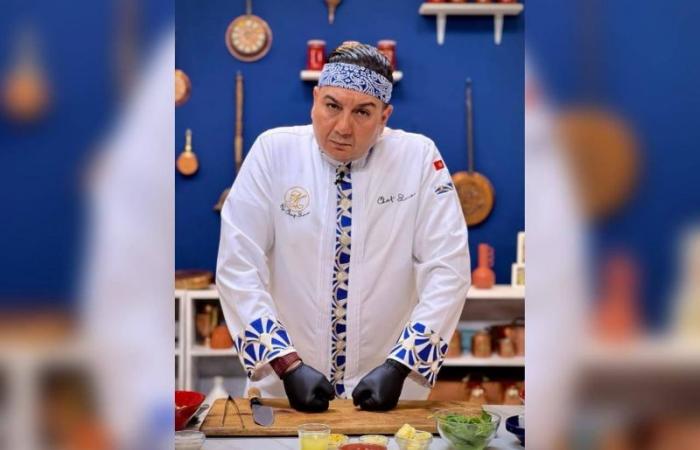Mohamed M’himdat: Chef Simo is above all a citizen of the world with a deep attachment to his Moroccan roots. I spent 27 years abroad, a journey which allowed me to train and acquire invaluable cultural and professional wealth. I obtained two master’s degrees: one in psychology and sociology, and the other in marketing and hotel management. These training courses gave me a global and multidimensional vision, which I apply today in my culinary career.
My professional experience in the hospitality sector has taken me to the four corners of the globe: Germany, France, the Middle East, Dubai, Japan, China and the Maldives. Each country offered me a new perspective and allowed me to immerse myself in different techniques and flavors.
Six years ago, I decided to return to Morocco. This return to my roots marked a turning point in my life. That’s when I participated in MasterChef, an unforgettable adventure that allowed me to win the title and make my dream of becoming a chef come true. Today, I strive to promote Moroccan cuisine internationally by mixing tradition and innovation, while sharing my passion for the culinary art.
From hotel management to cuisine… Why this big shift?
Cooking has always been a passion rooted in me, inherited from my mother since my childhood. Although it was a space for creativity and sharing, I did not initially envision it as a career. During my 23 years in the hospitality industry, where I held operations management positions, cooking remained a personal pleasure, an escape and a way to reconnect with my roots.
Everything changed after my participation in MasterChef, which allowed me to realize that cooking could become much more than a passion: it could be a vocation. It was from that moment that I decided to transform this love into a profession. I started a restaurant consulting company to help other professionals create and manage their establishments. Subsequently, I opened three restaurants.
My first restaurant offers Moroccan fusion cuisine, combining history and modernity. For example, I created Moroccan sushi, combining local ingredients like saffron, argan and mint with international culinary techniques. This project embodies my vision: to promote Moroccan cuisine on a global scale, to modernize it while preserving its authenticity and its soul.
How do you think Moroccan cuisine can serve as a cultural bridge?
My attachment to Moroccan cuisine is based on its incredible history, dating back more than 12 centuries, which reflects Andalusian, Berber and Arab influences. It is a cuisine that tells stories, that spans time and cultures, and that embodies the very soul of our heritage. It is rich, varied and unique, with dishes and flavors that never cease to amaze.
Let’s take emblematic products like argan oil, real liquid gold, or our palette of spices like Taliouine saffron or ras el hanout. They are not just ingredients: they are a reflection of our lands, our ancestral know-how and Moroccan hospitality. Each dish, whether it is a tagine or a couscous, carries a part of our identity.
This culinary heritage is an invaluable treasure that I strive to promote and share with the whole world. My ambition is to make it a cultural bridge, because cuisine is a universal language. Through a dish, we can transmit emotions, tell a story and introduce people to a country.
By promoting Moroccan cuisine, I not only hope to promote our heritage, but also inspire others to explore and appreciate the richness of our traditions. It is a mission that is close to my heart and which guides all my initiatives, whether local or international.
You have also accomplished the feat of entering the Guinness World Records. What was your main recipe for such success?
It was an incredible experience, and a source of great pride for me. I made the largest “briouate in the world”, a technical challenge which allowed me to become the first Moroccan chef to appear in the Guinness World Records. The idea was to bring together the flavors of Morocco in a single dish. For this challenge, I chose the 30 greatest Moroccan culinary specialties and revisited their recipes, which I integrated into a giant briouate.
The name “From Tangier to El Gouira” symbolizes the diversity of our gastronomic heritage, from the north to the south of the country. It was a way of celebrating the richness of Moroccan culinary traditions in a single creation. My ambition is to multiply these types of initiatives to continue to promote Moroccan cuisine on the international scene.
-You place a lot of emphasis on promoting Moroccan gastronomy internationally. What ingredients should I use to do it effectively?
This involves several strategic axes. First of all, it is essential to develop “food export”. Moroccan products such as olive oil, argan oil, spices, or even local fruits and vegetables, must become essential on international markets, in the same way as soy sauce for Asian cuisine or parmesan for Italian cuisine. We have culinary treasures that deserve to be on supermarket shelves and in kitchens around the world.
Then, modern tools such as social networks and television play a vital role in this mission. They make it possible to reach a diverse and global audience in just a few clicks. Finally, we must also focus on global culinary events. Participating in festivals, organizing Moroccan cooking workshops, and inviting yourself into the kitchens of major international restaurants are all ways of making our know-how known. I dream of seeing Moroccan dishes like tagine or pastilla become as popular as sushi or pizza. This requires a coordinated strategy between leaders, exporters, and institutions, but it is entirely possible.
How can we remedy the problems plaguing the catering sector in Morocco?
This sector indeed suffers from a lack of regulation, and it is crucial to remedy this urgently. Currently, anyone can call themselves a chef without having the appropriate training. Becoming a chef should be linked to professional studies and recognized skills, with specialized commissions to validate these titles. Otherwise, it allows anyone to proclaim themselves a specialist, which harms the credibility of the profession.
Being a Moroccan chef is about more than just mastering culinary techniques. It is also about understanding the traditions, history and influences that shape our gastronomy. A chef must be trained in different areas: cooking, but also management, service and the culture that goes with each dish. It is not just a profession, but a real concept.
Today, the frequent openings and closings of restaurants illustrate a lack of competence and regulation. To ensure the sustainability of the sector, it is necessary to establish rigorous management and guarantee the qualification of the workforce. A clear professional framework, with specifications for the opening of establishments and qualified managers, is essential to supervise this economy.
What about the skills shortage in the restaurant sector?
This is a real problem. Many restaurants are closing due to lack of qualified staff and suitable human resources. It is crucial to train professionals, not only in cooking, but also in business management. Morocco has immense development potential in this sector, but this requires the establishment of relevant training programs and the attraction of competent talent to manage establishments and boost the economy.
The future of the sector is promising, but it depends on our ability to structure the industry. Morocco is booming, and catering is an integral part of this dynamic. By 2030, Morocco could become a major player on the world stage. However, to achieve this, it is imperative to establish strict regulation and train a new generation of qualified chefs and restaurateurs.
The culinary art seems to interest young people more and more. What advice could you give to budding chefs?
I would tell them to have passion and dedication. This profession requires a lot of investment, but it is extremely rewarding. It is also crucial to promote and regulate the profession of chef in Morocco, with quality hotel schools which train our young talents. Morocco has immense potential. Together, we can propel our gastronomy onto the world stage.
READ ALSO







